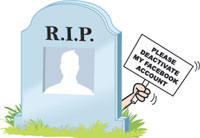My friend, who died four years ago, is still on Facebook. People leave birthday wishes on his wall and comments on pictures of him. It really starts to get weird when someone who doesn’t know he’s dead leaves a message on his wall, and that then comes up in my newsfeed. It’s disquieting, and for those who were close to him, quite painful, I’m sure.
And this can’t be his only account – he must be up on Twitter and on Myspace, on Flickr and on Goodreads. Everywhere, his accounts go on as if he weren’t dead, but merely absent. Would my friend want this strange sort of immortality for himself? To be frozen in time, still liking Farmville and Metallica? I’m not sure. I certainly don’t want it for myself.
So here’s the million dollar question - how do you manage your online account when you’re dead? Well, it begins with having to trust the living. If you’re willing to look your digital mortality in the face, you could consider hooking up with a company like LifeEnsured which was launched this month. ‘We unravel your online life after you’re gone so your family and friends won’t have to,’ runs their catchy slogan.
There are others like Entrustet (‘Decide how you’ll be remembered. Pass on the keys to your digital legacy’) and Legacy Locker (‘The safe and secure way to pass your online accounts to your loved ones’) that all operate on the same premise – you can control what happens to your online identity after you’re gone for a approximately $24 a year.
These companies typically offer encrypted space to store passwords and other account information that are then handed over to your designated recipient after the company has verified that you are in fact dead. LifeEnsured, though, seems to be taking it up a notch. You can not only have your Facebook account deleted or turned into a memorial (more on that shortly) you can also leave a final status message, disable wall postings, change your bio (theoretically to the past tense) and even transfer ownership of the account. Their services span over 30 online entities including Twitter, Wordpress and Paypal. The site will even manage the delicate business of letting your blind dates on Match.com and eHarmony know you’re going to have to stand them up since your unavoidably detained. For the truly generous, you have the option of allowing all your Flikr images to be used under Creative Commons license, thereby ensuring another kind of immortality.
If you’re not keen to sign up, you might want to know how the website will handle your account: Hotmail will allow your relatives to order a CD of all the messages in your account, if they provide a death certificate and proof of power of attorney. Gmail requires the same paperwork plus a copy of an e-mail the deceased sent to the petitioner. If you’ve got things in there that you’d rather no one saw, this might be the time to delete them. Flikr is a little more sensitive – they’ll keep your account up and open to the public. However, if you marked a photograph private, they’ll keep the faith. Even friends and family won’t be able to access them. Yahoo appears to be the most fiercely private of all – no one is given access to your account, but your next of kin can decide to have it deleted.
On Facebook, however, your family or friends could choose to ‘memorialize an account.’ In a post on the Facebook blog last year, the company said, “We understand how difficult it can be for people to be reminded of those who are no longer with them, which is why it's important when someone passes away that their friends or family contact Facebook to request that a profile be memorialized.” Once this is done, the deceased will no longer appear as a macabre ‘friend suggestion’ on your profile.
The privacy settings are tweaked, such that in a memorialized account, only confirmed friends can locate it or access it. Possibly sensitive information such as contact information and status updates are scrubbed, as the account is frozen ensuring that a prankster won’t be able to log it. “Friends and family can leave posts on the profile Wall in remembrance,” says the company.
It’s a long way from the quiet graveyard, but a Facebook memorial doesn’t seem like altogether a bad thing – especially since you get to choose about how you will be remembered.
|


